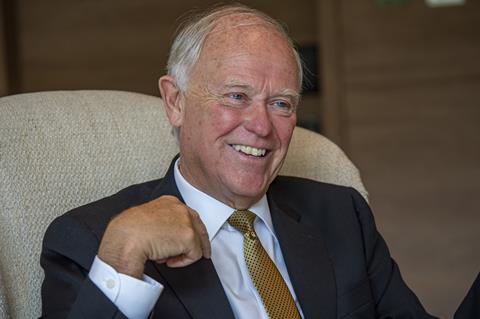Emirates may not receive its first Boeing 777X until 2026, the airline’s president Sir Tim Clark has admitted.
The carrier is the largest customer for the long-delayed widebody and added to its original launch order with a commitment for 90 examples at last November’s Dubai air show to take its total orderbook to 205 units. At the time Emirates said it expected delivery of its first 777-9 in October 2025.

However, during a discussion in front of an Aviation Club audience in London on 29 February, Clark expressed doubt that the latest schedule would be met.
“Every day is a different day at Boeing,” Clark says, referring to his conversations with the airframer about the timetable for deliveries. “It could be the back end of next year, but more likely early 2026.”
In a wide-ranging conversation with Aviation Club committee member Max Kingsley-Jones of Ascend by Cirium, Clark also accuses Airbus and Boeing of “falling asleep at the wheel” during the pandemic by not anticipating the rapid rebound in demand for air travel and says Emirates would continue to operate its Airbus A380 fleet until the late 2030s.
He says a large factor behind the challenges Airbus and Boeing are facing in ramping up their output in the wake of the Covid-19 crisis is that both manufacturers “shut down their supply chains” during 2020. Many smaller companies were not able to recover when demand returned.
The airframers are “reaping the whirlwind” of that decision, he says. “There is no shortage of orders either for narrowbodies or widebodies, but the difficulty is with the OEMs getting aircraft out the door.”
Additionally, Clark insists Emirates will not order the A350-1000 until Rolls-Royce “gets the engine right”. He has criticized the durability performance of the XWB-97, the widebody’s exclusive powerplant.
While Emirates signed for a further 15 A350-900s at the Dubai air show to take its orderbook to 65 of the type, the airline has held off committing to the larger version of the widebody because of issues with the XWB-97. Clark says his message to the UK engine maker is: “If you can get the engine right, it [the A350-1000] will do great things for us.”
AIRPORT SHIFT NEEDED FOR GROWTH
Clark also spoke about Emirates’ need “at some point in the future” to relocate its operation from the increasingly capacity-constrained Dubai International to Al Maktoum International, south of the city, where he said “significant planning” is in place to construct a giant terminal and other infrastructure. However, he says it is for Dubai Airports and the Dubai government to announce a timetable for the move.
Emirates has been working more closely with sister airline Flydubai, which at the Dubai air show ordered 30 Boeing 787-9s, its first widebodies. Emirates operates an-all twin-aisle fleet. Clark says the two carriers are “bolted at the hip” and between them have created a “network that is one of the largest in the world”. Flydubai, he says, will use its 787s to “go to places we wouldn’t”.
Despite probing, one subject Clark remains tight-lipped about is the long-anticipated date of his retirement, which had been set for 2020 until he opted to stay on to see the business through the Covid crisis. “All of us have to move on at some point,” is all he would reveal.
He says, however, that the recent promotion of 19 senior executives, including the creation of two “deputy presidents”, is to prepare the airline for “its third epoch”, adding: “There’s an awful lot coming with Emirates.”























